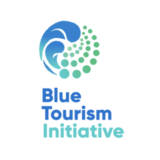Accounting for around 10% of the world’s GDP and total employment before the COVID-19 pandemic, tourism is one of the world’s largest and globalized industries. Beyond financial revenues and socio-economic benefits, tourism produces negative impacts, including on ecosystems and resources upon which communities depend for their livelihoods. Coastal communities have borne the weight of the environmental, social and cultural impact of tourism, as the Ocean is increasingly coveted for its strategic resources and coastal areas become more crowded and depleted. However, there are possible approaches to ensuring sustainable and resilient tourism, based on collaboration and respect for local populations.
The Blue Tourism Initiative was launched in 2022 at the UN Ocean Conference in Lisbon to support the exchange of knowledge, good practices and experiences among three major marine regions sharing similar environmental and social challenges related to coastal and maritime tourism: the Mediterranean, the Western Indian Ocean and the Caribbean Sea. This initiative aims to improve the governance of coastal and marine tourism, ensure its sustainable, inclusive and resilient development, and address the associated environmental, health, socio-cultural and economic challenges.






